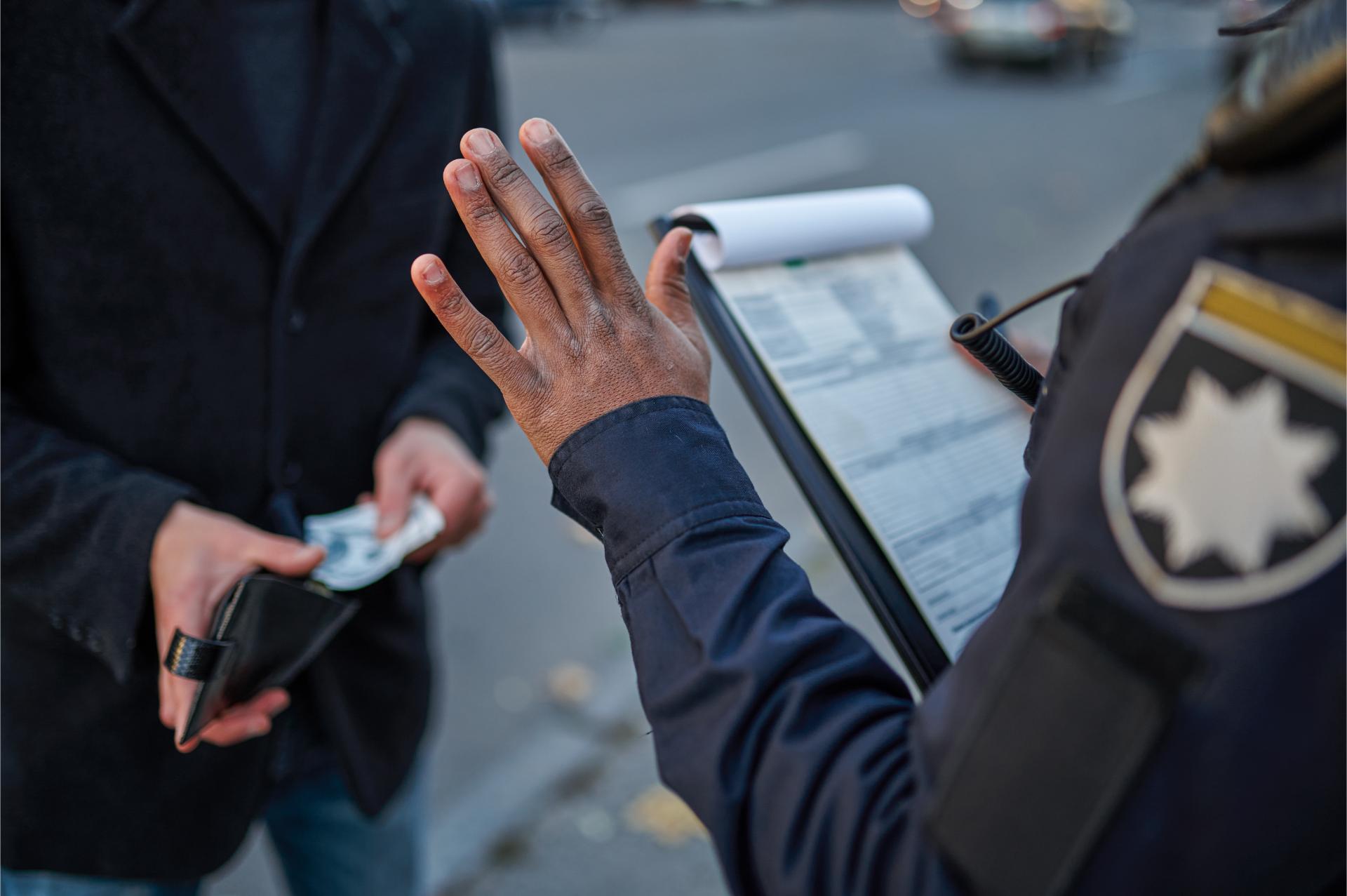Trying to give a police officer money, gifts, or favors to get special treatment is against the law in California. Penal Code 67 makes it illegal to offer any kind of bribe to a cop. It doesn’t matter if they take it or not—just making the offer can get you in serious trouble.
Bribing the police is a felony, and you could end up facing prison time. Prosecutors don’t take these cases lightly. If you’ve been accused, it’s important to know what the law says and what defenses might be available.
Legal Definition of Bribery of Police Officers (PC 67)
Penal Code 67 makes it illegal to offer anything of value to a police officer in exchange for special treatment. This law targets any act of bribing the police, even if the officer refuses the offer.
What is Penal Code 67 in California?
Under Penal Code 67, it is a crime to offer a bribe to any executive officer in California. This includes police officers, sheriffs, and other law enforcement officials. The law makes it illegal to try to influence an officer’s actions through money, gifts, or promises. Even if the officer refuses the offer, the person who made it can still face charges.
In short, bribing the police is a felony under CA 67 law. The law targets anyone who tries to affect how a police officer does their job by offering something of value. This falls under the broader category of police bribery in California.

Key Elements Required to Prove Bribery in California
To convict someone under 67 PC, the prosecution must prove three things:
- The person offered a bribe to a police officer or executive officer.
- The bribe was offered to influence an official act, such as dropping charges or avoiding arrest.
- The person acted with corrupt intent, meaning they knew the offer was wrong and made it to gain an unfair benefit.
The law focuses on the intent, not the outcome. This means the crime happens the moment the bribe is offered, whether accepted or not.
Is 67 PC a Felony or Misdemeanor?
The 67-PC is considered a felony offense in California. If you’re found guilty and convicted, you’ll face as long as four years in prison, hefty fines, or other penalties. Most of the time the case, this case isn’t reduced to a misdemeanor offense.
A conviction for paying bribes to police is recorded on your record and could hinder your chances of getting employment, retaining some rights, or even moving ahead in your life. That’s the reason why every police corruption investigation must be handled with care. Speaking to a seasoned lawyer immediately will help you comprehend the options available to you.
What are the Penalties for Violating 67 PC?
Anyone who violates Penal Code 67 can face grave legal consequences. In the context of 67, this crime is considered a criminal offense and can be punished with prison time as well as fines and an indelible mark on your criminal record.
If you made a bribe offer to a police officer, the court doesn’t need proof that the officer was willing to accept the offer. The act of bribing police can be enough to warrant conviction. The penalties can be as high as four years in a state prison, as well as fines up to $10,000.
Since police bribery cases typically contain attempts to interfere with the justice system, district attorneys tend to pursue these cases with a lot of force. A conviction for a felony under the 67PC can affect future employment opportunities or immigration status, as well as firearm rights. In a majority of instances, the person is subject to collateral consequences, for example, losing professional licenses or the ability to be eligible for public service positions.
What are the Legal Defenses for Bribing the Police?
A skilled Los Angeles criminal defense lawyer can help you challenge the case through one or more legal defenses. Not every accusation under Penal Code 67 leads to a conviction. The facts of the case and how the defendant engaged in conduct are critical.
No Executive Officer
One defense to bribery is that the person receiving the bribe was not an executive officer. For bribery of public officials under 67 PC, the law only applies if the target is someone with legal authority to carry out official acts, such as a sworn law enforcement officer. If the person was not legally defined as such, different charges may apply.
No Corrupt Intent
To violate Penal Code 67, the person must act with corrupt intent. This means the bribe was made with a specific goal in mind: to gain unfair treatment. If the accused did not have the intent to influence an official act, then the prosecution may not be able to prove the required mental state.
Entrapment
Another possible defense is entrapment. This applies if law enforcement persuaded someone to commit criminal charges they would not have otherwise committed. If officers pressured the defendant into engaging in conduct they were not inclined to do, a court may dismiss the case.
Can a Party Get a Conviction Expunged?
Yes, a person convicted under Penal Code 67 may be able to clear their record through expungement. To qualify, the individual must complete probation or a jail sentence and must not be facing any new charges.
Expungement updates the case status to show it was dismissed, which can help when applying for jobs or housing. However, it does not remove the fact that the conviction happened.
Even if someone was found guilty of bribing the police, they may still be eligible. Speaking to experienced criminal defense attorneys is important to understand what relief is possible in each case.
How does a PC 67 Conviction Affect Gun Rights?
A conviction under CA 67 can lead to the loss of firearm rights. Because bribing the police is charged as a felony, the law prohibits owning or buying firearms in the future.
This restriction applies even if the sentence involved only probation. The loss of gun rights is automatic after a felony conviction for police bribery or any offense involving law enforcement and corrupt influence.
Related crimes
Several other California laws deal with different forms of bribery, depending on the person involved and the act committed. While Penal Code 67 focuses on bribing the police, other codes address when public officials accept bribes or when other roles are targeted.
- Executive officer taking a bribe – PC 68 and 69: These laws apply when a law enforcement officer or public official accepts a bribe in exchange for performing or avoiding an official act.
- Bribery of witnesses – PC 137 and 138: These laws make it a crime to offer anything of value to a witness to change their statement, refuse to testify, or avoid court.
- Bribery of legislators – PC 85 and 86: These sections address bribes offered to lawmakers to sway votes, decisions, or political actions. Like police bribery, this is treated as a serious felony.
Each of these crimes falls under the larger category of bribery of public officials and carries severe criminal charges.
Be Aware!
Penal Code 67 makes it explicit that giving cash or other benefits to influence the conduct of the police is a criminal violation. Even if a police official is not willing to accept an offer to bribe them or other bribes, the crime of offering bribes or other favors to officers could be enough to warrant the arrest of a police officer. The cases are handled strictly and often result in long-term consequences.
If you’re charged with bribery or corruption by police, it’s important to take the matter seriously. An appointment with experienced criminal defense lawyers can help you defend your rights and know the legal options you have.





